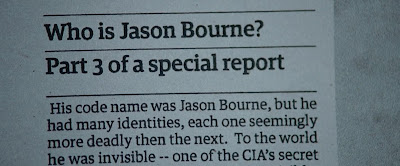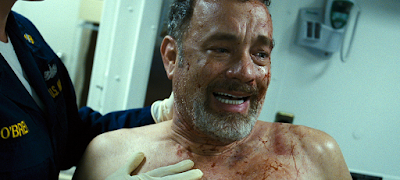or
"To move forward...you must first remember"
It is 1870, five years after the Surrender at Appomattox Court House, and Captain Jefferson Kyle Kidd (Tom Hanks), late of the 3rd Texas Infantry, is making his way between Indian Territory and Texas with ultimate goal of reaching—maybe—San Antonio. His peculiar job is to read the news as he travels from town to town, charging the attendees a Liberty dime for the privilege of hearing news that might not otherwise reach them by post or by messenger. He's careful about what he reads, as the bitterness of the Civil War still festers in the souls of the Southerners, only enhanced by the presence of "Blue Coats" maintaining military order in the restless, discontented villages. What Kidd finds in his listeners is a belligerence, born of Union occupation without any promised Federal help, if anything, Federal interference. When protests break out, all he can do is assuage and sympathize and encourage. "Times are hard. We all need to do our part. All of us. We're all hurtin'. These are difficult times."
He might as well be speaking to us.
Outside of Wichita Falls, he comes across a wagon overturned by some violent, unnatural means. He dismounts, warily taking his rifle, and moves down the road, ears sharpened and eyes peeled for signs of life...or malice. What he finds is a black man hanging from a tree, with a notice that Texas is a White Man's Territory. He has barely enough time to register this atrocity when a rustle in the scrub alerts him to someone else watching him. It is a young girl (Helena Zengel), blond, dressed in buckskin, and resistant to being captured, although capture her he does. The wagon's contents contain papers from the Bureau of Indian Affairs, giving the responsibility of returning this girl—named Johanna Leonburger—recently survived of a raid on Kiowa land to her nearest kin, allegedly living in Castroville, Texas.A passing Union patrol provides no help, and just instructs Kidd to take her to the nearest Bureau office and drop her off, even as he protests that he can't be bothered with transporting a child—a child twice orphaned as it happens. The patrol has other concerns and his aren't theirs. At a checkpoint, Kidd talks to the closest Union official and is informed that the Bureau rep is on the reservation and won't be back for three weeks, so Kidd can either stay or deal with it himself. He chooses the latter, grousingly, and gets outfitted with a wagon, supplies, and a contraband gun—Kidd only has bird-shot in his rifle—by a former Infantryman of his, who warns him that the kid is wild, and then is proven right, when "Johanna" disappears while Kidd is off reading the news. Kidd finds her that night in the pouring rain on a riverbank pleading with a passing Kiowa caravan to take her back, that neither hears her, nor seems to care. That burden, that pilgrimage, takes up the bulk of News of the World, maybe the most leisurely film director Paul Greengrass has ever made (but then he hasn't made a Western before...). Adapted—rather freely—from the best-seller by Paulette Jiles, it follows Kidd and Johanna (her Kiowa name is "Cicada") on the long trip to Castroville, episodically beset by obstructions natural and man-made that impede their journey, usually in the vicinity of some hard-scrabble settlement that will one day turn into a strip-mall suburb in modern Texas. Greengrass' game-plan is simple: begin with a slow drone-driven shot of the landscape (most of the film was shot in New Mexico), then locate Kidd and kid in it, and take it from there. The hardships include a gang of ruffians who seem hell-bent on buying (if it comes to that) Johanna for their own purposes, an abattoir of a settlement slaughtering buffalo and ruled by an autocratic kingpin, a wagon disaster, a Kiowa band that keeps an eye on them, and a sandstorm that seems to come out of nowhere...all that besides the usual hazards of running out of provisions—especially water—and the usual feeding schedules of horses.


As they travel, Kidd tries to teach her English, and to that end—and because it makes her responses easier—he learns Kiowa, and is stunned to learn that she also can speak a little German, remembered back from before her first family was killed in a Kiowa raid, and, once adapted into a Kiowa family, seeing them killed in a Cavalry ambush. Though they're traveling the same path, Johanna's retraces the past, while Kidd's journey is one trying to forget it. Same route, different destinations. 
Hanks' character in the book is supposed to be 71, and that's a far stretch for the actor. The screenwriters make him younger, without the long history of soldiering; Hanks' Kidd has had enough of it with his participation in the most recent one. Hanks does lend a weary, lived-in feel to his Kidd, but is so internalized that he's a bit of a mystery. Hanks is best when he has someone to play off of, and his work and the movie come alive when he comes across his stray charge, who's short of talk. Zengel has a performance both studied and spontaneous, where it seems like she's making it up as she goes—despite having to speak in three languages, English, Kiowa, and German—it is a naked and guileless performance. I don't care how good Hanks is, the movie lives and dies by her work in this film, and the movie seems to heave aloft whenever she's on the screen.
News of the World doesn't jolt along as most Greengrass films do. It meanders, but doesn't poke. And has that tense element of film-storytelling that entices: with a big frontier out there, wild and loose, what will happen next, what lies around the next bend? With the nation cleaved in two, suspicions of the next stranger you run into, the corrupt grasping for power, and a sizable distance of time and space between rumor and truth, anything can happen, and one's hopes and future can seem, at best, tremulous.
What strikes one as one watches News of the World unfold is that nothing has changed much...except the guns have gotten better.





























